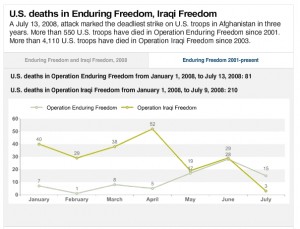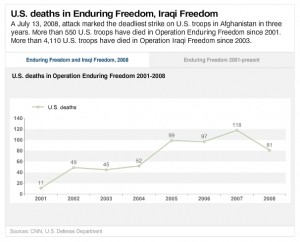7000 Police Deployed in Kabul, While Pakistan Retreats from NWFP
BY Herschel SmithThe past few days have seen an unprecedented number of police deployed in Kabul, Afghanistan.
Security was tightened in and around Kabul on Sunday with 7,000 additional police officers deployed ahead of Monday’s 89th observance of Afghanistan’s independence from Great Britain.
Police were seen at newly established security checkpoints looking at every passing vehicle Sunday. Increased foot patrols were also apparent.
An Interior Ministry official said it was the biggest police operation in Kabul in several months.
Also on Sunday, dozens of Taliban militants were killed after they ambushed a convoy carrying supplies for NATO forces in southern Afghanistan, an Afghan official said.
Five security forces who worked for a private company were killed in the attack, in Zabul province, said Gulab Shah Alikhail, the deputy governor.
After the ambush, Afghan army forces were called in, Alikhail said.
Alikhail put the militants’ death toll at 32.
On Saturday, a roadside bomb killed 10 Afghan police officers in Kandahar province, according to Police Chief Matiullah Khan.
Khan blamed the Taliban and their al Qaeda associates for the attack.
“Who else is conducting this kind of cowardly acts except for the Taliban and al Qaeda people,” he said.
But it isn’t just the largest operation in several months. Kabul hasn’t seen this kind of security operations since the overthrow of the Taliban. Further, the police presence points to a security problem in the balance of Afghanistan, from which the threat comes.
A lawmaker from Kandahar who is critical of Karzai’s government said the police deployment has more to do with protecting the government’s reputation than reassuring the public.
“Unless they bring some comprehensive changes in the security, this deployment will not affect people’s confidence,” the lawmaker, Khalid Pashtun, said.
Pashtun said there had been a steady increase in kidnappings, robberies and other crimes this year.
“People are afraid to leave their house after 7 p.m.,” he said.
To the west, insurgents have been regularly attacking U.S.-led coalition and NATO supply convoys, burning fuel trucks and killing NATO and coalition soldiers.
To the east, the Tag Ab Valley of Kapisa Province has become the scene of near-daily clashes and airstrikes by the U.S.-led military coalition in Afghanistan.
Afghan and NATO officials insist that the nearly seven-year effort to bring stability to Afghanistan is progressing.
However, the security operation in Kabul is the second time this year that the authorities have taken extraordinary measures to reassure Afghans that cities are safe from a Taliban assault.
In June, Afghan and NATO commanders mustered thousands of troops to clear militants from a strategic valley within striking distance of Kandahar, Afghanistan’s main southern city.
Kabul is a center of gravity, and the Taliban know it. They are capable of forming en masse to threaten the city, and thus threaten the seat of government. The observances and celebrations are the raison du jour, and takes on no more significance than that. The real message here is the concern on the part of Kabul for its own stability, and the degrading security situation in Afghanistan.
Slightly to the Southeast in Pakistan, the Pakistani troops recently sent into the NWFP met with a nasty surprise.
When several hundred Pakistani troops backed by paramilitary forces on Friday launched an operation against militants in Bajaur Agency in the Federally Administered Tribal Areas of Pakistan on the border with Afghanistan, they received a most unwelcome surprise.
News of the offensive, which proved to be the most bloody this year in Pakistan, had been leaked to the Pakistani Taliban and al-Qaeda militants by sympathizers in the security forces, and the army walked into a literal hail of bullets.
Contacts familiar with the militants told Asia Times Online that every hill had observers as the first military convoys entered Bajaur – the main corridor leading to the Afghan provinces of Kunar, Nooristan, Kapisa and the capital Kabul – and they were quickly under attack.
In just a few hours, 65 soldiers were killed, 25 were taken prisoner and scores more were wounded. Under air cover, the soldiers retreated, leaving behind five vehicles and a tank, which are now part of the arsenal of the Taliban and al-Qaeda.
The Pakistani troops have retreated, as the Taliban regroup, rearm, train, collect “taxes” and continue to send fighters into Afghanistan to topple the government and return it to Taliban rule. Even if Pakistan was a consistent ally in the war against al Qaeda and the Taliban (and they are little more than a halting ally), they aren’t capable of anything more than harassment of fighters in the tribal regions. More troops are needed in Afghanistan, now and not later.





